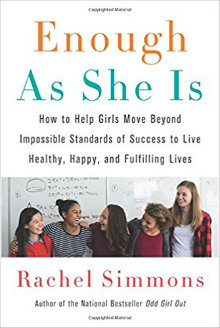Help Girls Move Beyond Impossible Standards
Enough As She Is: How to Help Girls Move Beyond Impossible Standards of Success to Live Healthy, Happy, and Fulfilling Lives
By Rachel Simmons
(Harper/Collins, 2018 – Learn more)

I pre-ordered Rachel Simmons’s newest book, Enough As She Is, the same day I learned its release date. I have followed her work since Odd Girl Out (now revised and updated), and The Curse of the Good Girl has been one of the foundations of my own work as an educator in a girls school for the nine years since its release.
My impression was that this would be more than just another iteration of her work, and indeed her ability to engage with and listen to girls and young women, and her courage in honestly thinking through the implications of what she hears, have led to something special.

We have long known that girls’ self esteem and confidence take a dive in middle school as they begin to think about the women into whom they are growing and as the weight of the often contradictory expectations of a patriarchal society descend upon them.
The core elements of self esteem in girls, according to JoAnn Deak, are connectedness, competence, and confidence, but Simmons asserts that not only does “the number of girls who describe themselves as ‘confident’ [decline] more than 25 percent during middle school” (p.x) but also “Girl competence does not equal girl confidence. Nor does it equal happiness, resilience, or self-worth.” (p.xi)
Simmons attributes this to “role overload” and “role conflict” (p.xi) and notes further that “The embrace of achievement over attachment is threatening not just girls’ wellness but, ironically, also their ability to succeed” (p. xii). Simmons warns that “to say girls are suffering because they’re ‘too perfectionistic’” – a judgment she heard constantly in researching this book, not just from adults but also from girls themselves – “is a simplistic excuse that lets everyone off the hook but the girls themselves” (p.xv).
Essential connections
Whether confronting the “College Application Industrial Complex,” navigating the world of social media, managing stress, or dealing with any of the other multiple and interlaced issues confronting girls in today’s society, it can help if we ground discussions in family values (or, in the case of schools and other communities of youth, core values held by the group).
While adolescence is at root about finding your identity and differentiating yourself from your parents, “adolescents, especially girls, are most resilient when they are connected to others. Girls themselves agree.” (p.xvii)
This of course does not mean trying to explicitly direct girls in certain directions – that just adds to the list of conflicting demands and pressures and the resulting sense of futility and loss of self esteem as girls strive to meet literally impossible expectations. Rather, it’s about using the relationship as a base to help each girl look clearly at what is going on, weigh her options, and make informed choices moving forward.
How caring adults can be supportive
For those of us working to support girls, this may also mean taking a clear look at ourselves. It’s not about our love for our kids; that is clear and a given. It’s more about how we live that love, define our most dearly held values, and go about living those values every day.
Rachel Simmons listens closely and honestly to the girls and young women in her life, and she is willing to be unflinchingly vulnerable and honest with herself, as she shares the girls’ own words and the various insights and lessons she garners. Throughout her career, Simmons has both enabled us to be our own best imperfect selves and helped us see how we can thus enable the girls in our lives to relax into their own self acceptance and be their best authentic selves.
Simmons’ impact on my students
Enabling girls to be their best authentic selves is essentially the mission of my school. We are located in Western Massachusetts, near where Simmons lives, and have had the opportunity and gift of working with her on multiple occasions. I couldn’t help thinking this year, through the week up to and including graduation, that she has left a positive mark on us in more ways than one.
Many girls, in saying their farewells during our Vespers ceremony or during graduation speeches, readily embraced their own imperfections and the inevitability and necessity of learning from mistakes and setbacks. They exuded a different kind of confidence than what you usually see – a sense that they had both the desire and the tools to face whatever life would bring them, to learn from each experience, and to remain true to themselves along the way.
We have elected to read Enough As She Is this summer as a faculty, with as always any interested staff member invited to join us. This experience will provide us with a broader and deeper understanding of what we have been doing well in supporting our kids and where we could improve – and most important, why all of that is true.
From what I hear in Rachel SImmons’s Facebook group, countless parents who are reading the book are having a similar experience in their own families. It’s an experience I would wish for everyone – for the girls first and foremost, but for those of us adults in their lives as well.
Bill Ivey is Middle School Dean at Stoneleigh-Burnham School in Western Massachusetts. He teaches Humanities 7 and both the Middle and Upper School Rock Bands. He is active on Twitter as @bivey and also blogs for his school.




























